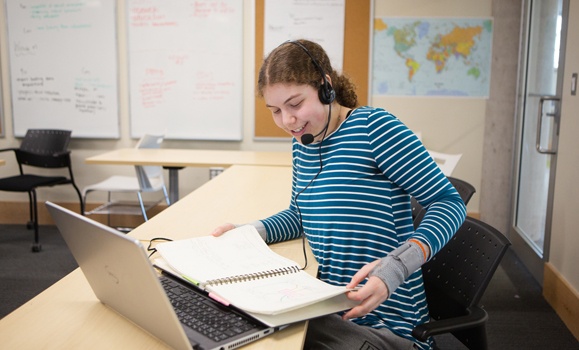When third-year Marine Biology student Caroline Leherbauer makes study notes, she doesn’t write them down or type them on her laptop anymore.
These days she wears a headset and tells the Dragon Naturally Speaking software on her computer what to write.
“A little popup menu with a big microphone button sits at the top of your screen,” she says. “You click the button, open a Word document and just start saying what you want to say. It’s kind of like Siri on a phone.”
Caroline uses the speech-to-text software due to Carpal Tunnel Syndrome brought on by years of repetitive writing and typing. It got to the point where it became too painful to write long exams, and the high volume of lab reports, papers and other assignments were taking their toll on her wrists and hands.
Using the Dragon software allows her to do less actual writing and typing herself, which helps mitigate the effects of her condition. But even with that support, Caroline has to be vigilant about how she uses her hands and wrists while doing school work. That means breaking up her study time into intervals of no longer than two hours each and taking breaks after classes where she has been taking notes by hand.
“I also find if my wrists are having a really bad day, it can be hard to focus on other tasks whether they be in the classroom or just doing school work at home,” says Caroline.
Meeting an important need
Caroline has been borrowing the Dragon software with its accompanying headset from the assistive technology lending library at Dalhousie’s Student Accessibility Centre in the Killam Library.
Seeing the benefits to students who use assistive technology, but knowing it can be cost prohibitive, centre director Quenta Adams committed to setting money aside and building inventory over the past several years. “The need was evident and the timing felt right so we opened the library last September” says Adams.
Besides the Dragon software, the tools currently available in the library are:
- Handheld C-Pens which read written text aloud and uploads the content to your computer
- Livescribe Smart Pens, which record everything you hear and read and synchronizes with your notes
- Both Kurzweil and Read and Write text to speech software
- Ergonomic keyboards, computer mice, and laptop stands
- Noise-cancelling, noise-isolating, and microphone-equipped headphones
- Zoom Text screen-magnifying software
- Samsung tablets and iPads pre-loaded with useful apps.
So far there have been about 30 students who have accessed the technology since the library opened. After applying online to borrow one of the tools, students are able to sign them out for two weeks. If they want to keep using them after that, and there is no waiting list for that particular tool, they can request to keep it for another two weeks.
Trying it out
While the Student Accessibility Centre has 1,175 students registered for support, including academic accommodations for the classroom and exams, Maria McNeil, technology and resource advisor in the centre, stresses that the lending library is available to any Dalhousie students who want to try out the tools.
“The purpose of the library is to allow any Dalhousie student to try the tools we have available, free of charge, so they can decide before purchasing if it will be something that will enhance their learning experience,” she says.
Caroline has discovered how the library, and other accommodations provided through the centre, have changed her overall university experience. Her confidence is stronger and her general attitude towards school work has improved thanks to the small changes that have been implemented.
“I feel my concentration for exams but and everyday studying is a lot stronger,” she says. “I used to dread essays, long-answer questions, and papers because I felt like I was at a disadvantage. Now that I know it doesn’t have to be that stressful and difficult to accomplish, I look forward to things like papers because I’m a person who really enjoys writing.”
To learn more about the assistant technology lending library, visit the Student Accessibility Services website.
Comments
comments powered by Disqus

